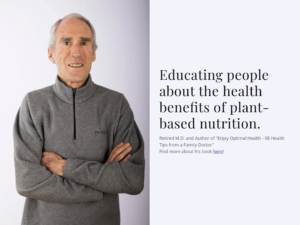Health column by Dr. Greg Feinsinger. Champion of Whole Food Plant Based Living and righteous person.
This column is another in a series taken from Dr. Barnard’s recent book “Your Body in Balance, The New Science of Food, Hormones, and Health.”
During women’s reproductive years, ovulation—the release of an egg—occurs every month, followed by a surge in their ovaries’ production of the estrogen estradiol and of progesterone. At around age 50, the ovaries run out of eggs, levels of these two hormones drop significantly, and monthly menstruation stops. Menopause is defined as women in their late 40s and early 50s who go for a year without a period.
Dr. Barnard states that menopause shouldn’t be dreaded, because it is “Mother Nature’s way of protecting you.” He points out that too much estrogen over the years—even natural estrogen made by a women’s own ovaries—increases the risk of cancer and other problems “so nature gave us a time-limited window of fertility so as to protect our overall health.”
Menopause can be associated with hot flashes, night sweats, moodiness, thinning of the bones, sleep difficulties, vaginal dryness, and other physical and emotional symptoms. However, this is determined to large extent by what people eat. For example, Japanese women on a traditional diet—high in soy and other plant foods—do not experience these symptoms. Nor did women on a similar traditional diet in a study done in Northern China. Another study, involving Mayan women on a traditional diet of squash, corn, and beans, showed the same thing.
In the 1950s and 60s, pharmaceutical companies developed hormone replacement medications, such as Premarin—an estrogen made from the urine of pregnant horses. American doctors were hopeful that hormone replacement would be the fountain of youth for women. However, it soon became apparent that use of estrogen in women with a uterus caused cancer of the endometrial uterine lining. PremPro—a combination of estrogen and progesterone hormones–was then developed to prevent this serious complication.
Hormone replacement did in fact relieve menopausal symptoms and thinning of the bones. However, in 1991 the N.I.H. launched a large, placebo-controlled study of hormone replacement called the Women’s Health Initiative. The study soon began to indicate that women taking Premarin had more strokes, blood clots, and dementia. Women taking Prempro had these risks plus more breast cancer and heart attacks. Finally, in 2017 the U.S. Preventive Task Force recommended against the use of hormone replacement for the prevention of health problems.
What about so-called bioidentical hormones? Instead of using horse urine, these hormones have the same chemical structure as natural human estrogen and progesterone. They can be compounded in specialized pharmacies, and are also available in regular pharmacies (for example, Estrace is a plant-derived copy of human estradiol). However, there is no evidence that “bioidentical hormones” are any safer than Premarin or PremPro.
Here’s what Dr. Barnard recommends as the best and safest way to avoid or treat menopausal symptoms: 1) Achieve and maintain ideal body weight. This seems counterintuitive because fat cells make estrogen, but for whatever reason research shows that thin women have fewer menopausal symptoms. 2) Increase intake of soy products because they have phyto (plant) estrogens, which attach to estrogen receptors that prevent menopausal symptoms and osteoporosis but don’t attach to estrogen receptors that cause blood clots, heart attacks, strokes, and breast cancer. Examples of healthy soy products are edamame (soy beans), tempeh, tofu, and unsweetened soy milk. 3) Menopausal women who are still sexually active and experiencing vaginal dryness should consider using an estrogen vaginal cream a few times a week—which is absorbed minimally into the blood stream and is probably safe. 4) Red clover (80 mg.) and black cohosh (20 mg.) have been shown to help with hot flashes.

Leave a Reply